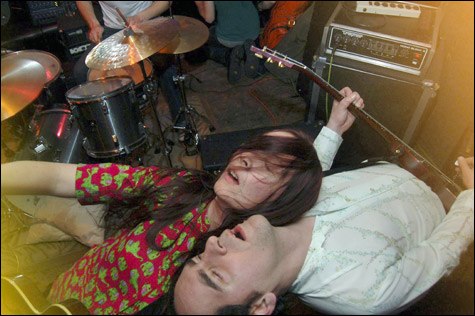
NOISE AND VOCALS: Major Stars want it all. |
With their triple-guitar heroics, lavish use of feedback, rock-hard rhythm section, and charismatic lead singer, Cambridge’s Major Stars are an explosive rock band. They seem to demand every hyperbolic cliché in the rock critic’s lexicon — they’re just that unpredictable, that incendiary, that unrelentingly (and exquisitely) loud.
At the center of the inferno is the husband-and-wife duo of Wayne Rogers and Kate Biggar, who’ve been the one constant in the band and its precursors, Magic Hour and Crystallized Movements, for almost 20 years. Although Major Stars have been around for nearly a decade, in its present form this is a distinctly new animal. What was a quartet with Rogers handling vocals is now a six-piece featuring singer Sandra Barrett, bassist Dave Dougan, drummer Casey Keenan, and guitarist Tom Leonard, a veteran of the band who only recently switched from bass.
Major Stars have just released Mirror/Messenger on the Chicago indie Drag City, and they’ve embarked on a tour that will culminate with a CD release show at the Middle East upstairs on December 15. With Drag City behind them, the band are likely to reach their largest audience yet. But capturing the essence of their sound in the studio has always been a challenge. On this latest album, however, the results are appropriately ferocious.
“It’s pretty brutal,” Rogers admits with a laugh, as five-sixths of the band (only Leonard is absent) sit around a table at Charlie’s Kitchen, just steps away from Rogers’s Harvard Square record shop, Twisted Village. “The CD sounds really clear, and it’s just like being punched in the face for 40 minutes. When I first heard it, I thought, ‘Oh! Maybe we really are as noisy as people say we are!’ ”
For all its hellish intensity, Mirror/Messenger is as melodic and song-oriented as anything the band have done, maintaining a delicate balance between the feral roar of guitars and Barrett’s sultry wail. There are some stellar three-minute pop songs, but it’s the certified bonecrushers, like the epic “My People,” that stand out. The immediacy of the sound is both exhilarating and unnerving — though I’d stop short of likening the album, as Biggar does, to a knee to the head.
“The thing that’s really great about the album,” says Keenan, “is that nothing’s buried in dissonance. Everything’s out in front. You really can hear all three guitars. You hear the real interplay between everyone in the band. It’s not hidden beneath production hiss.”
The relationship between the various elements in the band is especially complex on Mirror/Messenger. It’s the first album that has songs that Rogers wrote specifically for this line-up. Unlike the extended, guitar-fueled jams of earlier Major Stars recordings, these songs are leaner, meaner, more pared-down, with Barrett’s vocals front and center. For those who’ve seen the band in less than ideal conditions, her prominence may come as a bit of a shock. But Barrett’s singing is meant to be heard — Major Stars are not a noise band. “I really think we’re a pop band,” says Barrett, but since she previously sang in the abrasive art-noise band LA Drugs, her point of reference could be a little skewed.